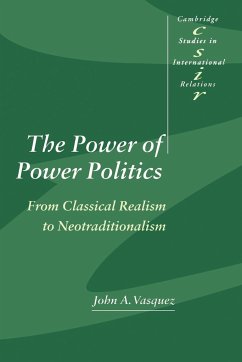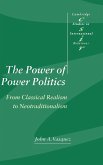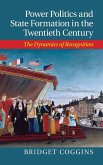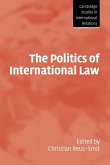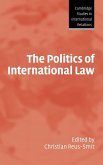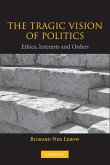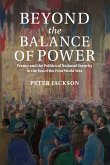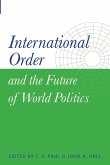John A. VasquezFrom Classical Realism to Neotraditionalism
The Power of Power Politics
From Classical Realism to Neotraditionalism
Herausgeber: Smith, Steve; Biersteker, Thomas J.
John A. VasquezFrom Classical Realism to Neotraditionalism
The Power of Power Politics
From Classical Realism to Neotraditionalism
Herausgeber: Smith, Steve; Biersteker, Thomas J.
- Broschiertes Buch
- Merkliste
- Auf die Merkliste
- Bewerten Bewerten
- Teilen
- Produkt teilen
- Produkterinnerung
- Produkterinnerung
This book provides an intellectual history of international relations theory from 1919 to the present.
Andere Kunden interessierten sich auch für
![The Power of Power Politics The Power of Power Politics]() John A. VasquezThe Power of Power Politics134,99 €
John A. VasquezThe Power of Power Politics134,99 €![Power Politics and State Formation in the Twentieth Century Power Politics and State Formation in the Twentieth Century]() Bridget CogginsPower Politics and State Formation in the Twentieth Century100,99 €
Bridget CogginsPower Politics and State Formation in the Twentieth Century100,99 €![The Politics of International Law The Politics of International Law]() Christian Reus-Smit (ed.)The Politics of International Law31,99 €
Christian Reus-Smit (ed.)The Politics of International Law31,99 €![The Politics of International Law The Politics of International Law]() Christian Reus-Smit (ed.)The Politics of International Law114,99 €
Christian Reus-Smit (ed.)The Politics of International Law114,99 €![The Tragic Vision of Politics The Tragic Vision of Politics]() Richard Ned LebowThe Tragic Vision of Politics28,99 €
Richard Ned LebowThe Tragic Vision of Politics28,99 €![Beyond the Balance of Power Beyond the Balance of Power]() Peter JacksonBeyond the Balance of Power46,99 €
Peter JacksonBeyond the Balance of Power46,99 €![International Order and the Future of World Politics International Order and the Future of World Politics]() T. V. Paul / A. Hall (eds.)International Order and the Future of World Politics37,99 €
T. V. Paul / A. Hall (eds.)International Order and the Future of World Politics37,99 €-
-
-
This book provides an intellectual history of international relations theory from 1919 to the present.
Produktdetails
- Produktdetails
- Verlag: Cambridge University Press
- Seitenzahl: 470
- Erscheinungstermin: 31. Januar 2012
- Englisch
- Abmessung: 229mm x 152mm x 28mm
- Gewicht: 757g
- ISBN-13: 9780521447461
- ISBN-10: 0521447461
- Artikelnr.: 22472999
- Herstellerkennzeichnung
- Libri GmbH
- Europaallee 1
- 36244 Bad Hersfeld
- gpsr@libri.de
- Verlag: Cambridge University Press
- Seitenzahl: 470
- Erscheinungstermin: 31. Januar 2012
- Englisch
- Abmessung: 229mm x 152mm x 28mm
- Gewicht: 757g
- ISBN-13: 9780521447461
- ISBN-10: 0521447461
- Artikelnr.: 22472999
- Herstellerkennzeichnung
- Libri GmbH
- Europaallee 1
- 36244 Bad Hersfeld
- gpsr@libri.de
Introduction; Part I. Classical Realism and Quantitative International
Politics: 1. The role of paradigms in scientific enquiry: a conceptual
framework and a set of principles for paradigm evaluation; 2. The role of
the realist paradigm in the development of a scientific study of
international relations; 3. Research design: defining and operationalizing
the realist paradigm; 4. Theory construction as a paradigm-directed
activity; 5. Data making as a paradigm-directed activity; 6. Research as a
paradigm-directed activity; 7. Evaluation: the adequacy of the realist
paradigm; 8. Theory and research in the 1970s: the emerging anomalies; Part
II. Neorealism and Neotraditionalism: International Relations Theory at the
Millennium: 9. Retrospective: neorealism and the power of power politics;
10. The promise and potential pitfalls of post-modernism: the need for
theory reappraisal; 11. The realist paradigm as a degenerating research
program: neotraditionalism and Waltz's balancing proposition; 12.
Mearsheimer's multipolar myths and the false promise of realist policy
prescriptions: the empirical inaccuracy of the realist paradigm; 13.
Challenging the relevance and explanatory power of the realist paradigm:
the debate on the end of the Cold War; 14. Conclusion: the continuing
inadequacy of the realist paradigm.
Politics: 1. The role of paradigms in scientific enquiry: a conceptual
framework and a set of principles for paradigm evaluation; 2. The role of
the realist paradigm in the development of a scientific study of
international relations; 3. Research design: defining and operationalizing
the realist paradigm; 4. Theory construction as a paradigm-directed
activity; 5. Data making as a paradigm-directed activity; 6. Research as a
paradigm-directed activity; 7. Evaluation: the adequacy of the realist
paradigm; 8. Theory and research in the 1970s: the emerging anomalies; Part
II. Neorealism and Neotraditionalism: International Relations Theory at the
Millennium: 9. Retrospective: neorealism and the power of power politics;
10. The promise and potential pitfalls of post-modernism: the need for
theory reappraisal; 11. The realist paradigm as a degenerating research
program: neotraditionalism and Waltz's balancing proposition; 12.
Mearsheimer's multipolar myths and the false promise of realist policy
prescriptions: the empirical inaccuracy of the realist paradigm; 13.
Challenging the relevance and explanatory power of the realist paradigm:
the debate on the end of the Cold War; 14. Conclusion: the continuing
inadequacy of the realist paradigm.
Introduction; Part I. Classical Realism and Quantitative International
Politics: 1. The role of paradigms in scientific enquiry: a conceptual
framework and a set of principles for paradigm evaluation; 2. The role of
the realist paradigm in the development of a scientific study of
international relations; 3. Research design: defining and operationalizing
the realist paradigm; 4. Theory construction as a paradigm-directed
activity; 5. Data making as a paradigm-directed activity; 6. Research as a
paradigm-directed activity; 7. Evaluation: the adequacy of the realist
paradigm; 8. Theory and research in the 1970s: the emerging anomalies; Part
II. Neorealism and Neotraditionalism: International Relations Theory at the
Millennium: 9. Retrospective: neorealism and the power of power politics;
10. The promise and potential pitfalls of post-modernism: the need for
theory reappraisal; 11. The realist paradigm as a degenerating research
program: neotraditionalism and Waltz's balancing proposition; 12.
Mearsheimer's multipolar myths and the false promise of realist policy
prescriptions: the empirical inaccuracy of the realist paradigm; 13.
Challenging the relevance and explanatory power of the realist paradigm:
the debate on the end of the Cold War; 14. Conclusion: the continuing
inadequacy of the realist paradigm.
Politics: 1. The role of paradigms in scientific enquiry: a conceptual
framework and a set of principles for paradigm evaluation; 2. The role of
the realist paradigm in the development of a scientific study of
international relations; 3. Research design: defining and operationalizing
the realist paradigm; 4. Theory construction as a paradigm-directed
activity; 5. Data making as a paradigm-directed activity; 6. Research as a
paradigm-directed activity; 7. Evaluation: the adequacy of the realist
paradigm; 8. Theory and research in the 1970s: the emerging anomalies; Part
II. Neorealism and Neotraditionalism: International Relations Theory at the
Millennium: 9. Retrospective: neorealism and the power of power politics;
10. The promise and potential pitfalls of post-modernism: the need for
theory reappraisal; 11. The realist paradigm as a degenerating research
program: neotraditionalism and Waltz's balancing proposition; 12.
Mearsheimer's multipolar myths and the false promise of realist policy
prescriptions: the empirical inaccuracy of the realist paradigm; 13.
Challenging the relevance and explanatory power of the realist paradigm:
the debate on the end of the Cold War; 14. Conclusion: the continuing
inadequacy of the realist paradigm.

